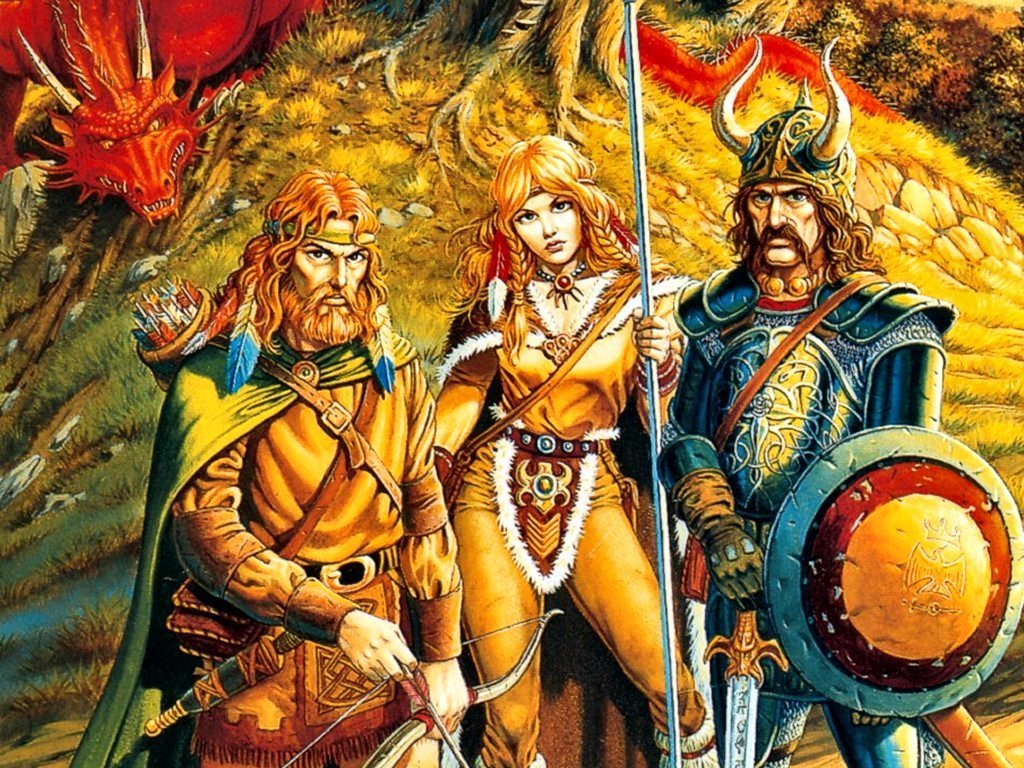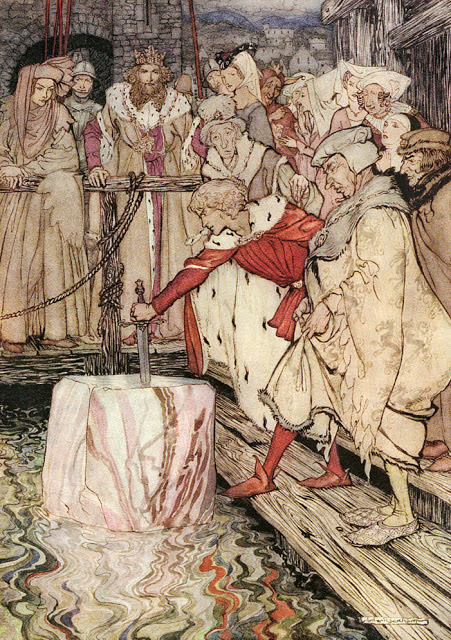
| Witness (2nd) | Spring (3rd) | Summer (4th) | Autumn (5th) | Winter (6th) |
| The Natural Order | - | Anoint (7th) | - | Spells |
Ceremony: Witness
(Evocation)
Level: 2
Range: Hearing
Duration: Special
Components: V, S
CT: 1 round
ST: None
AE: 1-4 individuals
Within their
society, druids
are legal officials as well as
religious leaders. Having a druid witness
an oath or vow makes it binding upon the
party or parties making the promise. The
person making the oath or vow presents
himself to the druid and pronounces it,
calling upon the powers that be to keep
the pledge made until its fulfillment.
The
druid then casts the spell, and the pledge
is completed. Various consequences may
befall the person failing to keep his word.
These consequences must be agreed to by
all concerned, and are made part of the
oath or vow. For example, a person might
promise to return with a herd of cattle
stolen from a neighboring lord. A time
limit might be offered by the oathtaker.
The oathtaker seals his oath by saying
something like, "and may my right arm be
palsied if I fail to fulfill this oath."
After the
druid witnesses the oath, the oathtaker
must fulfill his literal word, or his right
arm will indeed be palsied -- permanently.
The druid may advise the oathtaker
against making rash promises, and may
suggest suitable modifications of oaths,
but
the final say is the oathtaker's. After
witnessing
the oath (which the druid does at
his discretion), nothing more can be done
about it: The conditions are set, and the
powers invoked see to it that the consequences
are administered in the event that
failure occurs. Warriors often take oaths
to perform certain deeds. Druids take holy
vows at 1st level, 7th level, and 12th
level.
Unless a permanent condition is evoked
(such as an initiation to druidhood), once
the oath is performed the witness spell
expires. However, certain oaths might be
binding for years. The death of the oathtaker
breaks all but the most terrible
oaths. Note that there is no material component
for this spell.
Ceremony: Spring
(Evocation)
Level: 3
Range: Special
Duration: 1 year
Components: V, S, M
CT: Dusk to dawn
ST: None
AE: Druid's charge
The seasonal
spells of spring,
summer,
autumn, and
winter have the following
in common.
Range and area of effect are the druid's
charge: in other words, the land and people
under the druid's care, large or small.
If the druid is off on his own, then he
is in
his own charge. A party of adventurers,
if
of the druidic religion, might be considered
his charge. A druid of insufficient
level to cast one of these spells is part
of
someone else's charge, as are those people
and lands under the lower-level druid.
However, the junior druid must participate
in the ceremony conducted by a higher
level druid in order for his charge to
benefit.
It will be noted that it takes an Initiate
of the 9th Circle
to cast ceremony: winter, while
an Initiate
of the 1st Circle could cast ceremony:
spring. The lower-level druid will be
expected to conduct the ceremonies he is
capable of leading (casting). Furthermore,
he is to be in attendance on the nights
when the higher-level druids over him
conduct the ceremonies he is yet incapable
of leading (casting). Failure in either
case
could mean disaster for the druid and/or
his charge. These ceremonies are all-night
affairs, during which the druids keep vigil,
chant, make offerings, and perform certain
actions important to the community's
or kingdom's welfare for the coming year.
Ordinary worshipers are also participants,
although the druids do much of their
work withdrawn from the masses (and in
secret).
At the spring festival (Beltane), the sun?s
power to give life is celebrated. Great
fires
are lit, and cattle are passed between
them. Druids and people also process
between the fires, waving shoots of grain.
The fiery sun is associated with health
and
the destruction of disease, so it is easy
to
see that the main point of this festival
is to
ensure protection from disease for animals,
crops, and humans. If the rite is
performed, the druids charge will be
subjected to the usual disease checks
throughout the whole year to come at
– 10% probability. Beltane is also a major
civic festival and is associated with the
spring planting.
Ceremony: Summer
(Evocation)
Level: 4
Range: Special
Duration: 1 year
Compnents: V, S, M
CT: Dusk to dawn
ST: None
AE: Druid's charge

The Summer
Festival of Lugnasad begins with the allnight
vigil of Midsummer, the shortest
night of the year. On the night of the
first
full moon following Midsummer, great
fairs are opened. This is the time of year
when everything is in full flower. During
this time, all persons involved in the
ceremony
wear garlands, which are later
offered as sacrifices, beginning on Midsummer’s
Eve. This is the night when
druids
gather their mistletoe for the coming
year. As stated in the PH,
each druid must gather his own
mistletoe on this night for his spells
to
work at full potency during the next year.
If the druid cannot cast this spell for
himself,
he must gather with other druids
who will lead the ceremony, or the mistletoe
he gathers will be nothing more than
lesser mistletoe, even if gathered according
to the prescribed form. Lesser mistle-
toe, borrowed mistletoe, holly, and oak
leaves can be used in spell-casting, though
all spell ranges, durations, and areas
of
effect will be adversely affected. The
penalty for neglecting this festival is
obviously
the druids loss of spell potency
throughout the coming year — a penalty
which can provide dire consequences for
those who depend on the druids spell
abilities.
Ceremony: Autumn
(Evocation)
Level: 5
Range: Special
Duration: 1 year
Components: V, S, M
CT: Dusk to dawn
ST: None
AE: Druids charge

Samain is the
autumn harvest festival and the main
feasting time of the year, when all the
folk
assemble to offer their 1st fruits to the
gods. Great bonfires are built on prominent
hills,
and dancing and drinking go on
all night. The harvest’s bounty is meant
to
stave off hunger in the winter. Penalties
such as dearth and poverty are administered
to the druids charge for the coming
year if this festival is neglected (extra
expenses will be accrued, various treasure
collected will be deficient in value, etc.).
The DM must handle this condition of
misfortune throughout the year until the
next Samain. Figure at least 100 gp/level
of
additional unexpected expenses, loss, or
misfortune per month in this event.
Ceremony: Winter
(Evocation)
Level: 6
Range: Special
Duration: 1 year
Components: V, S,
M
CT: Dusk to dawn
ST: None
AE: Druids charge
Offerings of milk
are in order for
Imbalc, the winter festival.
It is the lambing
season, and like
lambs, the year is
born as the sun begins
to wax again. Yule
is the longest night of
the year, so this
is the longest spell in all
the
druids repertoire. It is a petition for
strength. Neglecting
this spell produces a
– 5% penalty in XP
earned
for the next year;
the HD of animals
born are rolled at
– 1 hp per die.
Ceremony: Anoint
(Evocation)
Level: 7
Range: Touch
Duration: Perm.
Components: V, S, M
CT: 18 turns
ST: Special
AE: 1 individual

This rite is used
to raise kings, high-level druids,
and other
important persons to their stations. Various
other rituals accompany the rite. In
the Celtic view of things, sovereignty
is a
goddess to be wooed and wedded. The
candidate is expected to make offerings
to
the holy groves, conduct great sacrifices,
and give away vast amounts of wealth to
the poor to please his “bride,” the Power
of
Sovereignty. Displays of physical prowess
in the candidate are part of the rituals
leading up to his annointing. Finally,
the
anointing takes place. If the candidate
proves himself good, wise, liberal, and
powerful, he is accepted by the Sovereignty,
and is allowed to take up his station.
At Tara, the kingstone upon which
the new High King stood was supposed to
cry out for the true king when he stood
upon it. Arthur’s
being able to pull the
sword
from its enchanted resting place is
much the same sort of thing.
The Natural Order,
By Arthur Collins